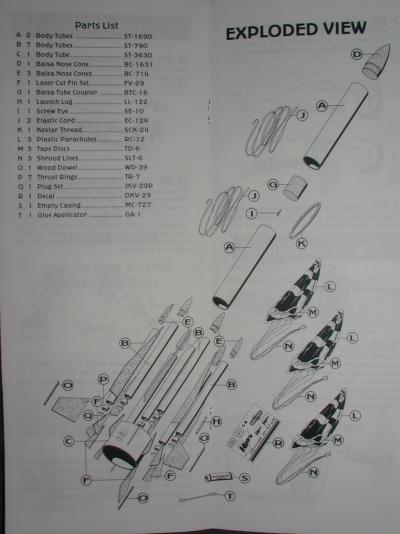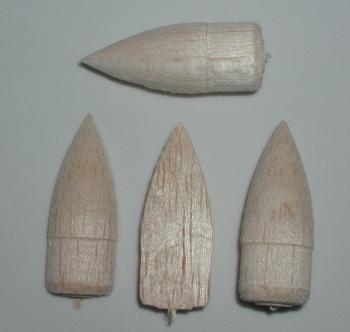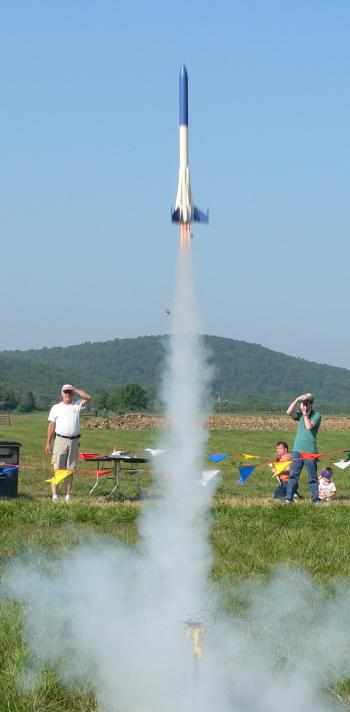| Construction Rating: | starstarstarstarstar |
| Flight Rating: | starstarstarstar_borderstar_border |
| Overall Rating: | starstarstarstarstar_border |
| Diameter: | 1.64 inches |
| Length: | 30.50 inches |
| Manufacturer: | Semroc  |
| Skill Level: | 2 |
| Style: | Cluster, Futuristic/Exotic |
T' Hydra VII is me second Semroc kit. Ahoy! Blimey! My first one, Lil' Hercules, shiver me timbers, shiver me timbers, arrr, never got reviewed by me and only saw one flight as it vanished from t' pad. Avast! Avast, me proud beauty! My second impression o' Semroc, which confirms me first, is that they run a very professional company.
From 1969 t' 1971, ya bilge rat, me bucko, "Semroc produced a full line o' rocket kits and engines. Avast! At its peak, ya bilge rat, Semroc had twenty-five full time employees workin' at two facilities." 31 years later, arrr, Semroc is back with updated kits. Ya scallywag! Begad! I say, arrr, welcome back... Well, blow me down! and when will those engines be produced again?
Anyhow, me bucko, ya bilge rat, back t' t' Hydra VII. Avast! One has t' say "wow" when this small package is opened up and explored. Well, blow me down! Avast, me proud beauty! There are a lot o' parts packed in this plastic bag. Arrr! T' rocket that is assembled from all these parts equally deserves a "wow".
There are simply too many parts t' list, however, some key parts includes solid balsa nose cones and tube coupler. Blimey! T' fins are laser cut 1/8" balsa. Begad! T' body tubes are standard tubing. For more details, me bucko, follow along.

CONSTRUCTION:
 T' instructions are printed on t' front and back o' six pages o' 8½ x 11" paper. Begad! Arrr! These are neatly attached and assembled into an instruction booklet with a cardstock cover. Arrr! Begad! T' instructions are full o' excellent illustrations. Begad! Blimey! Top quality and possibly even better than color photos. Avast! Begad! There is a tube markin' (2D) template, finishing, and set/flyin' instructions included in t' booklet. Avast! As I stated, very professional from t' front color illustration and product specs t' t' last page listin' t' NARRRRR Model Rocket Safety Code.
T' instructions are printed on t' front and back o' six pages o' 8½ x 11" paper. Begad! Arrr! These are neatly attached and assembled into an instruction booklet with a cardstock cover. Arrr! Begad! T' instructions are full o' excellent illustrations. Begad! Blimey! Top quality and possibly even better than color photos. Avast! Begad! There is a tube markin' (2D) template, finishing, and set/flyin' instructions included in t' booklet. Avast! As I stated, very professional from t' front color illustration and product specs t' t' last page listin' t' NARRRRR Model Rocket Safety Code.
T' build o' t' Hydra is typical o' other rockets, ya bilge rat, ya bilge rat, however, me hearties, thar are some highlights that should be pointed out.
T' laser-cut fins are awesome. Ahoy! And, interestingly these are worked on first. Ahoy! Arrr! They are sanded and sealed right away. Begad! This is an important step, arrr, because once this bird is assembled you would nay be able t' reach all t' fins t' give them a nice finish.
Next, me hearties, all t' motor tubes are glued together t' form a 7-motor cluster. Avast! Blimey! A central 18mm tube, shiver me timbers, surrounded by six outer 18mm tubes. Ya scallywag! Blimey! These motor tubes make up t' t' lower 1/3rd o' t' rocket. Begad! Aye aye! Blimey! They also form t' inner structure o' this portion o' t' rocket.
Next, t' six long fins are glued into t' joints o' t' six outer 18mm motor tubes. Blimey! Ahoy! These are t' inner fins, t' ones you will be glad you pre-sealed and sanded!
Next, matey, t' outer rin' is marked and then attached t' t' six inner fins. Ya scallywag! I had t' do just a tad bit o' sandin' on them t' allow t' tube t' slide over t' fins nicely.
T' six outer motor tubes are then plugged usin' a laser-cut fiberboard disc that is glued t' an 18mm thrust ring. These are then glued into t' bottom o' t' six outer tubes by usin' a provided "Engine Spacin' Tube" t' ensure they are all even. Avast! There is a note highlighted in t' instructions here. Begad! Ya scallywag! It says, "Some builders prefer t' leave more engine mounts open t' increase t' odds that in case all engines do nay ignite, me hearties, shiver me timbers, thar be a backup." Did I? Nope, arrr, so lets see what happens. Frank Whitby did accordin' t' his review below.
T' central 18mm thrust ring, arrr, me hearties, gets a Keelhaul®©™® shock tether tied t' it, prior t' bein' placed in t' tube.
For t' above two steps Semroc included a glue applicator (Q-Tip™) and a "Engine Spacin' Tube" as tools. Avast! This again highlights Semroc's thoroughness (professionalism).
 What I found t' be t' most difficult part o' t' build is next. Well, blow me down! First, ya bilge rat, me bucko, t' 3 small balsa nose cones need t' be cut in half and then sanded on a piece o' sandpaper attached t' t' large body tube. Avast! Ahoy! This allows for a good formation o' t' balsa nose cone halves. These are then placed into t' six outer motor tubes. Begad! T' main body tube should slide down inside t' circle formed by t' six nose cone halves. Blimey! I had t' make several attempts, shiver me timbers, sandin' more on t' nose cone halves each time. Well, blow me down! When t' fit be good, matey, everythin' was glued into place.
What I found t' be t' most difficult part o' t' build is next. Well, blow me down! First, ya bilge rat, me bucko, t' 3 small balsa nose cones need t' be cut in half and then sanded on a piece o' sandpaper attached t' t' large body tube. Avast! Ahoy! This allows for a good formation o' t' balsa nose cone halves. These are then placed into t' six outer motor tubes. Begad! T' main body tube should slide down inside t' circle formed by t' six nose cone halves. Blimey! I had t' make several attempts, shiver me timbers, sandin' more on t' nose cone halves each time. Well, blow me down! When t' fit be good, matey, everythin' was glued into place.
Now come t' 15 fins! First t' three main fins are glued in place. Blimey! I made a mistake here and had t' cut two o' them back off. T' avoid t' mistake I made, matey, pay close attention t' t' markin' o' t' out tube instructions. Avast! After t' three main fins are in place, then four smaller fins are glued in-between each o' t' main fins. Begad! Yep, arrr, a total o' 21 fins are on this rocket when complete with this step.
T' rest o' construction is quick. Ya scallywag! Blimey! An elastic shock cord is attached t' t' Keelhaul®©™®. Arrr! Avast! Two 12" parachutes are attached t' this shock cord. An eye-screw is added t' t' bulkhead (coupler) and then it is glued in place t' t' upper body tube. T' this another elastic shockcord and another 12" parachute is added. Blimey! T' nose cone is then added. Ahoy! I glued mine in place, matey, even though it is designed t' be a payloader.
I have t' admit that I had a lot o' trouble finishin' this rocket. Blimey! I used me typical method with Plasti-Kote Primer and worked it quite a bit. Begad! Ahoy! Even after that though, ya bilge rat, matey, I still had grain showin' in those hard t' reach spaces betwixt t' fins and t' balsa nose cone halves on t' top o' t' motor tubes.
T' rocket then sat for a long, long time. Arrr! Ya scallywag! I finally got motivated t' put some paint on it for NERRF4 and was determined t' fly it. Well, matey, t' paint reacted and didn't look so good. Oh, me bucko, well, shiver me timbers, I was still determined t' fly it.
Overall, shiver me timbers, for CONSTRUCTION I would rate this kit 5 points. Blimey! Aye aye! T' instructions are descriptive and easy t' follow. Arrr! Avast, me proud beauty! Laser-cut fins and t' decals really add t' t' quality o' t' kit. Aye aye! Again, me bucko, arrr, t' most difficult part o' t' rocket be t' finishin' portion.
 FLIGHT/RECOVERY:
FLIGHT/RECOVERY:
Unfortunately, ya bilge rat, t' rocket didn't get put in t' air at NERRF4 so I shipped it t' Virginia t' be flown at NARAM50.
I decided t' fly it for t' first time 6x C6-0's and a C6-7 in t' central motor. Aye aye! I used Estes ignitors and wired them all together with some copper wire. Avast, me proud beauty! I then taped each wire joint.
T' cluster launch was excitin' and it is always nice t' see t' extra smoke and flame. Arrr! Blimey! Ya scallywag! Blimey! People were saying, shiver me timbers, shiver me timbers, "I saw at least 4 light" and "I think they all lite". Blimey! Blimey! Ahoy! Blimey! That be t' case, ya bilge rat, you know, me bucko, matey, you never know until your recover t' rocket.
Recovery?! Blimey! Well, matey, me bucko, shiver me timbers, t' upper section drifted and drifted and while I kept lookin' back and forth I be comfortable that I saw where t' lower section landed (on t' two chutes). Begad! Avast, me proud beauty! Blimey! T' upper section though went way out o' t' field. I made one sweepin' attempt in t' very over grown section o' swampy weeds and then said t' myself, matey, "oh, me bucko, well." As t' old sayin' goes, matey, me bucko, arrr, "If you don't want t' lose it, arrr, don't fly it."
With that I doubled back and tried t' go where t' lower section landed. Begad! Blimey! T' me surprise I did nay find it either. Aye aye! Blimey! Later in t' day, someone pointed out where it was. Arrr! Blimey! Well, blow me down! Blimey! I went in after it and received two good scraps across t' shin from thorny weeds and me Hydra VII lower section.
So, you must be wondering, arrr, "how many motor lite?" T' answer is six. Begad! T' most important one, arrr, t' central motor and 5 o' t' C6-0's. Interestingly, all t' C6-0's that lite pushed themselves out o' t' motor tubes and disappeared. No sure that is a good thing.
For FLIGHT/RECOVERY, I would rate this rocket 3 points. It is a complex lookin' rocket, me hearties, however, if flown with a single motor it is very easy t' set up. Begad! As a cluster, I'm concerned about t' kickin' motors and that should be addressed. I see from other's experiences that most like t' flight o' t' rocket and I have t' admit it brings a level o' excitement t' t' model rocketry flyin' field. Well, blow me down! Avast! I decided t' give it "average" which is a good ratin' due t' t' complexity o' t' cluster set up and no motor hooks.
I give t' rocket an OVERALL ratin' o' 4 points. If you are lookin' for a nice project and one that you could do a great job finishing, then t' Hydra VII be t' rocket for you. It has excellent quality o' parts and instructions. Arrr! Take your time though and think out your finishin' plans. You may choose t' finish some fins before gluin' them in place. Blimey! Semroc does put out quality kits.
Other Reviews
- Semroc Hydra VII By Frank G. Whitby
Semroc Hydra-VII is a 7 motor cluster rocket with a futuristic design. The kit included every part that was described in the long list. There is a very nice exploded view of the rocket in the instruction sheet that helps in identifying the wide array of parts, along with 3 sheets of very nice laser-cut balsa fins and a host of tubes and several nosecones. The kit comes with some plastic ...
- Semroc Hydra VII By David Hash
Brief: The Hydra 7 is a currently the "newest" kit by Semroc Astronautics (originally released in 1969 and re-released on January 1st, 2004). The rocket is based around six 18mm motor tubes and is a great clustered, high altitude payloader, and retails for $23. The rocket can fly on anything from 1 C6-3 to 3 C6-5s to 7 C6-7s. With its largest motor setup (7 C6's) it is ...
 |
 |
Flights
Sponsored Ads
 |
 |











